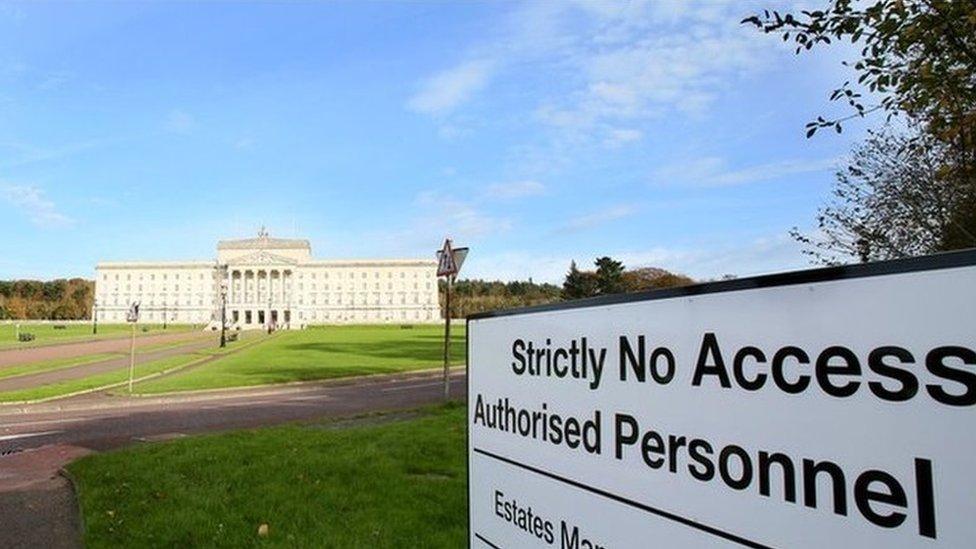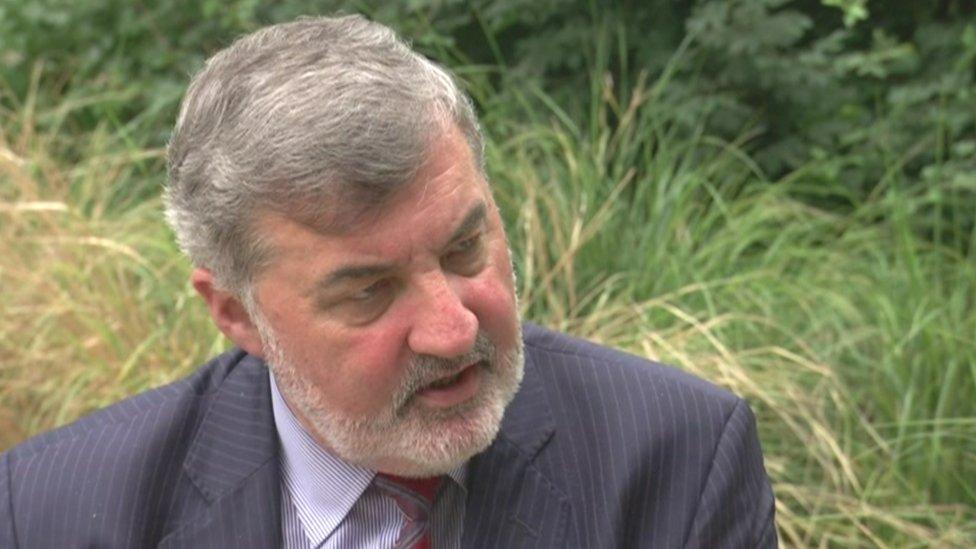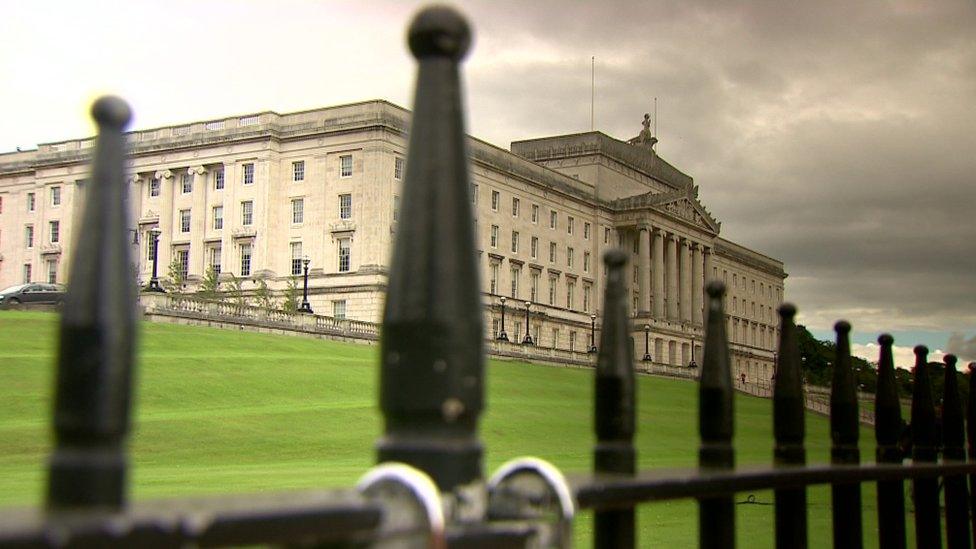Double jobbing: How dual mandates became an NI political problem
- Published

The Northern Ireland Assembly at Stormont has been a no-go for Northern Ireland's MPs - but that could change
Multi-tasking has never been a problem for our politicians.
Why have one job when you can have two, or maybe three?
Ian Paisley and John Hume, for example, were for many years simultaneously members of the House of Commons, the European Parliament and the Northern Ireland Assembly.
For a while in the 1980s, the North Down MP James Kilfedder was famously paid more than the prime minister when he was also speaker of the assembly.
And for years after Stormont returned post-1998, the vast majority of Northern Ireland's 18 MPs also held seats in the assembly and some even had third roles as executive ministers.

Ian Paisley and John Hume were for many years simultaneously members of the House of Commons, the European Parliament and the Northern Ireland Assembly.
It was the political norm until the expenses scandal hit Westminster and trust in politicians hit rock bottom.
In the public outcry which followed, the acceptable dual mandate was re-labelled unacceptable double jobbing.
Holding office in Westminster or Stormont were full time jobs, decreed an under-pressure David Cameron at the time.
His manifesto pledge to end double jobbing in 2010 eventually made it into law in Northern Ireland in 2014 and was fully enacted by 2016.
Ironically, the man who helped draw up the rules ending the practice here is the same man who has laid out the plan to bring it back now in a time-limited way.
Lord Caine knows his way around government.
He was special advisor to six Northern Ireland secretary of states and is now the Northern Ireland Office's point man in the Lords.
As parliamentary under-secretary of state for Northern Ireland he last week set out the government plan to allow MPs to be elected to Stormont while retaining their seat at Westminster but only for a limited time.

DUP leader Sir Jeffrey Donaldson could stand for election to the Assembly and retain his Westminster seat
As it stands those who make the move have just eight days to decide which political path they plan to follow, be it to Belfast or London.
This new plan would allow MPs more time to make that call.
They could sit in both chambers until the next Westminster election, which is due in 2024 but might come sooner.
They will only receive one salary though, picking up an MPs wage of £81.000 without the extra £51,000 paid to MLAs
But, crucially in the current context, it removes the prospect of a by-election.
So, Democratic Unionist Party (DUP) leader Sir Jeffrey Donaldson can now stand for election to the assembly safe in the knowledge he can retain his Westminster seat and avoid a potentially tricky by-election in Lagan Valley.
A by-election in which the Alliance Party was preparing a serious challenge having closed the gap considerably in recent elections.
Ironically, it was a former Alliance leader Lord Alderdice who has played a role in potentially scuppering that challenge.
The now Liberal Democrat peer first proposed the plan in December to remove the ban on dual mandates in a time-limited way to encourage more MPs to make the transition.

Lord Alderdice led the Alliance Party from 1987 to 1998 and is now a Liberal Democrat peer
In putting forward his amendment in the Lords he recalled the benefits of having experienced Westminster legislators in the assembly.
He also argued the move would bring the UK closer together, by aligning laws across the nations, and remove some of the "silos" in the devolved regions.
He even proposed a similar arrangement for TDs from the Dáil (Irish parliament) hoping to stand for election to Stormont
But the Alderdice amendment has angered the current Alliance leadership, with MP Stephen Farry accusing his former leader of a "fundamentally poor judgement call".
He dismissed his plan as a "backward step".
But Lord Alderdice did get support from other Northern Ireland peers.
Former Ulster Unionist and now conservative peer Lord Trimble and former DUP deputy leader Lord Dodds backed him.
While former Social Democratic and Labour Party (SDLP) leader Margaret Ritchie said she believed there was "a case for this amendment in that it provides for the transitional phase", she remained strongly opposed to double jobbing.
The government minister Lord Caine raised concerns about the Alderdice amendment arguing it could allow for double jobbing to remain indefinitely.
Bill likely to pass with Labour's support
He proposed redrafting the amendment with the consent of Lord Alderdice and now that reworked proposal will be put before the Lords this week.
Expect a more heated debate this time round.
But it is unlikely the plan will be derailed as Labour has previously indicated support for a return of dual mandates in a time-limited way.
Former Shadow Secretary of State Louise Haigh has previously indicated that support in the House of Commons chamber.
For Labour, it is about bringing Northern Ireland into line with other parts of UK where MPs can sit in devolved administrations.
Douglas Ross, leader of the Scottish conservatives, currently sits as an MSP in Edinburgh and as an MP in Westminster.
But for parties at Stormont this move is all about protecting the DUP from an uncomfortable by-election.
A "shameless stunt" is how the Traditional Unionist Voice (TUV) has described it while Sinn Féin, SDLP and Ulster Unionists have directed their anger at the the Northern Ireland Office.
As Mike Nesbitt put it "going out of its way to prop up the DUP".
In response, those behind the proposal insist it was talked about long before Sir Jeffrey Donaldson was elected DUP leader and it is aimed at levelling Northern Ireland up with other parts of the UK.
But the narrative has already been set by the DUP's opponents and expect lots of talk of double jobbing in the run up to the election.
- Published16 January 2022

- Published15 January 2022

- Published14 January 2022

